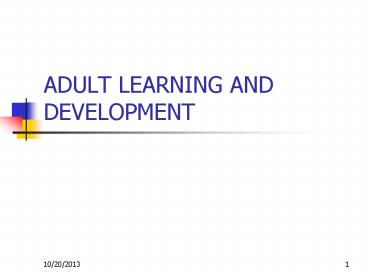ADULT LEARNING AND DEVELOPMENT - PowerPoint PPT Presentation
1 / 18
Title:
ADULT LEARNING AND DEVELOPMENT
Description:
ADULT LEARNING AND DEVELOPMENT Adult Learning and Development Faculty Development Workshop How to Teach Non-Traditional Students January 17, 2006 Presented by ... – PowerPoint PPT presentation
Number of Views:154
Avg rating:3.0/5.0
Title: ADULT LEARNING AND DEVELOPMENT
1
ADULT LEARNING AND DEVELOPMENT
2
Adult Learning and Development
- Faculty Development Workshop
- How to Teach Non-Traditional Students
- January 17, 2006
- Presented by
- Dr. Thomas Hawkins
- Dr. William Hine
- Dr. Barbara Powell
3
Theories of Adult Development
- Contextual
- Developmental
- Age-related
- Domain specific
- Stage
- Life-span perspective
- Transition perspective
4
Contextual Perspective
- Social clock
- Normative and non-normative events
- Social roles
5
Developmental PerspectiveSeasons of LifeAge
related
- Daniel Levinsons theory
- Early Adult Transition 16-20
- Entering the Adult World 21-29
- Settling Down 30-34
- Becoming Ones Own Person 35-39
- Midlife Transition 40-42
- Restabilization 43-50
6
Developmental PerspectiveDomain-specific
- Loevingers ego development
- Fowlers faith development
- Kohlbergs moral development
- Crosss racial identity development
- Casss homosexual identity development
- Piagets cognitive development
- Any other theories that focus on one domain of
development
7
Developmental PerspectiveStage Theory
- Erik Erikson
- Basis trust vs. Mistrust
- Autonomy vs. Shame and Doubt
- Industry vs. Inferiority
- Identity vs. Role Confusion
- Intimacy vs. Isolation
- Generativity vs. Stagnation
- Integrity vs. Despair
8
Identity Statuses
- James Marcia
- Foreclosure
- Moratorium
- Diffusion
- Achievement
9
When is a Student Non-Traditional?
- Age?
- Roles?
- Years out of school?
10
Needs of Traditional andNon-Traditional Students
- Traditional
- Non-traditional
11
Need for Academic Advising/Counseling
Traditional Nontraditional
Major/Minor Advising 78.4 50.9
Tutoring 21.9 12.9
Study Skills Help 35.5 20.4
Self-Confidence 27.0 21.0
12
Need for Support Services
Traditional Nontraditional
Career Planning 61.6 46.5
Campus Housing 25.7 21.0
Part-time Work 45.3 15.0
Orientation 47.1 34.1
13
Need for Integration Services
Traditional Nontraditional
Study Places 52.4 39.5
Lounge Places 31.3 27.2
Ways to Meet 31.3 17.0
14
Need with regard to Delivery Systems
Traditional Nontraditional
Evening Courses 23.3 34.6
Weekend Courses 6.2 17.7
Evening Offices 34.2 27.4
15
Nontraditional Student Services
Traditional Nontraditional
Childcare 5.9 21.9
Family Recreation 7.8 17.9
Nontraditional Office 15.0 52.4
16
Understanding Adult Transitions
- 1.Situationis the situation perceived as
positive, negative, expected, unexpected,
desired, undesired? - 2.Selfdoes the person have experiences with a
similar transition believe there are options
have no problem with ambiguity?
17
Understanding Adult Transitions
- 3. Supportsboth physical (financial assets) and
emotional (support from family and friends). - 4. Strategiesuses a variety of methods for
dealing with the transition change the
situation change the meaning of the situation
manage stress
18
The Need to Matter
- Attention
- Importance
- Dependence
- Ego-extension
- Appreciation































